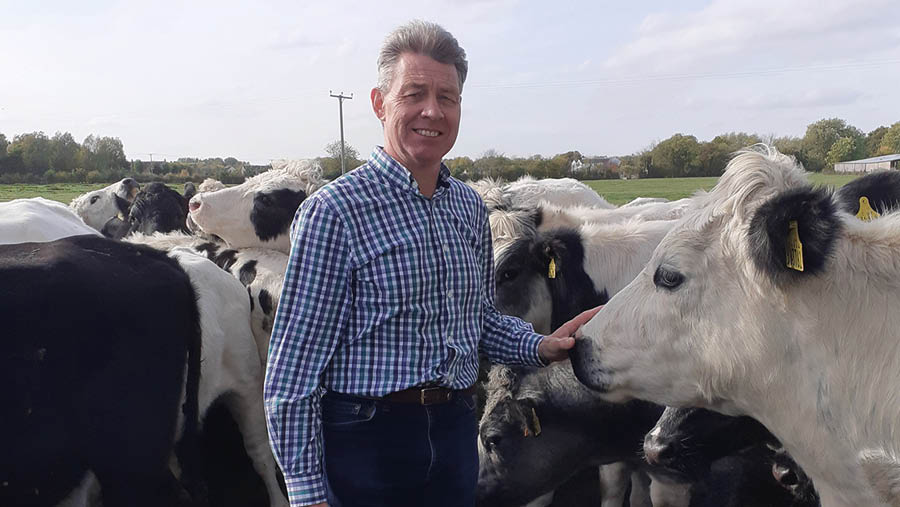Analysis: Supreme Court rules on disinherited son’s claim to farm
 © Leighton Collins/Adobe Stock
© Leighton Collins/Adobe Stock A Supreme Court appeal over a promised farm inheritance has settled how a farmer’s son is to be compensated after he was cut out of his parents’ wills.
We look at the issues involved and the details that led to the compensation decision.
See also: Inheritance promises can end up in court
Background to the case
The legal dispute between Andrew Guest and his parents, David and Josephine Guest, of Tump Farm, Monmouthshire, began in 2017.
Andrew’s original claim in the High Court was based on an area of law known as proprietary estoppel.
This is where the owner of property, usually land, gives an assurance to another person that they either already have or will be given or will inherit that property, or an interest in it.
The person receiving that assurance then relies on it to their disadvantage or detriment, following which the owner of the property goes back on the assurance or dies without making it good.
The courts have the power to decide on the validity of a claim of this type and on how to enforce the assurance.
For example, by ordering a transfer of the property to the person to whom it was promised, or by ordering a payment to be made to the claimant.
Delivering a summary of the Supreme Court judgment, Lord Briggs said that the facts of this case were typical of many that have given rise to this issue.
“The defendants David and Josephine own a farm. They have three children, Andrew the claimant, Ross and Jan,” said Lord Briggs.

Andrew Guest © Andrew Guest
“They promised Andrew, the eldest, when he was in his teens that if he spent his life thereafter living and working on the farm for his parents he would inherit a sufficient part of it to be able to continue a viable farming business there and to live there after their deaths.
“Relying on that promise after leaving school in 1982, Andrew spent some 32 years living on the farm in a small cottage, later with his wife and children, and working there at relatively low wages.
“His parents made wills giving effect to their assurance and they made him a partner in the farming business, but Andrew and his parents then fell out.
“In 2014, David and Josephine cut Andrew out of their wills. They dissolved the business partnership with him and evicted him and his family from the cottage. Andrew now lives elsewhere and works on but doesn’t own another farm.”
See also: Family court disputes highlight inheritance issues
In the first stage of this case, the High Court found that a promise had been made to Andrew and had been broken, also that Andrew had relied on the promise to his detriment.
The judge decided that there had to be a clean break between them, ordering the farm be sold and the proceeds divided between the parties.
Andrew was awarded 40% of the value of the farm, the amount that had been promised in the parents’ wills, plus 50% of the value of the farming business to reflect his partnership share, all representing a value of £1.3m.
Appeal at Supreme Court
The Court of Appeal upheld this order, so the parents appealed to the Supreme Court.
They did this on the grounds that the amount Andrew had been awarded was more than the value of the detriment he had suffered and more than the net value of the contribution he made to the farming business in excess of what he was paid.
The Supreme Court had to decide whether the amount of the award to Andrew should be based on his expected inheritance or, as his parents argued, compensation for the detriment he had suffered through working for decades for low wages.
Proprietary estoppel explained
This area of law can be used by a person who claims a promise or assurance was made to them in the past about the inheritance or likely inheritance of a property.
The claimant must show that the assurance was made and that they had relied on that assurance to their detriment.
The parents’ argument regarding the basis of the award was rejected by the Supreme Court, in a three-to-two decision.
Two of the five judges considered that the remedy to Andrew should have been based on the detriment he suffered, which they estimated at £610,000.
However, the parents’ appeal was allowed to a limited extent.
The Supreme Court found that the sum awarded in the High Court should have been discounted to reflect the fact that Andrew would receive compensation earlier than if he had inherited an interest in the farm on the death of his parents.
Lord Briggs said the parents should be entitled to choose between putting the farm into trust for the children, subject to a life interest in the parents’ favour, or making an immediate payment of compensation.
The compensation should follow what the High Court judge had ordered, but with a discount to reflect that Andrew would be receiving his expected inheritance early.
If the parties cannot agree the amount of this payment following valuation of the farm, or the terms of the trust if that route is chosen, they must go back to the High Court for a decision.
Lasting effect on future claims
David and Josephine Guest were represented in the appeal to the Supreme Court by Robert James, partner in Thrings’ agricultural litigation department.
He said that the long-awaited judgment in this case would have a lasting effect on future legal claims over family farm disputes.
Mr James said: “The court was at pains to stress that the claimant should never be in a position where they are made better off than if the promise had been fulfilled.
“It had in mind the situation where there is accelerated receipt. In the event that a case requires a clean break that involves the person to whom the promise has been made receiving something early, then that is permitted, subject to there being a significant discount.”
Polly Ridgway, senior associate with Clarke Willmott, was part of the firm’s team representing Andrew Guest.
Ms Ridgway said: “Andrew’s parents put in place a series of measures that were designed to leave Andrew, in his 50s, with no home, no job, no savings and no pension, despite a lifetime of hard work.
“Aside from being a significant decision in this area of law, the case also highlights the need for those involved in or contemplating bringing inheritance disputes to get expert legal advice as soon as possible.”
Watch Lord Briggs reading the summary of the judgment
Proprietary estoppel claims questions
Why are there so many cases of this type?
Farm inheritance disputes have common features including:
- Land that has been in families for generations but with little succession planning
- Promises often made verbally
- Arguments of disadvantage. Due to the nature of farming businesses where the work is hard and wages relatively low, it can be fairly straightforward to show that someone has suffered detriment by believing that they would eventually inherit some, or all, of the farmland or business.
Do claims usually reach court?
It is quite unusual for these claims to reach court, given the time and expense involved. More often, as the court expects, parties negotiate to attempt to settle claims.
There can be serious legal cost consequences for not having done so.
However, reaching settlements in these types of cases can be difficult. There is often little written evidence, with the parties relying on their own recollection and belief.
Will we continue to see cases like this in the future?
Yes, because despite similar themes, each case is very fact-specific. Hence the court reaches different conclusions based on the fact-sensitive nature of the cases.
Predicting the outcome of these cases remains difficult.
How can these types of claims be avoided?
It is advisable to record in writing any decisions and promises at the time that they are made, preferably formalised in a deed or a will.
If intentions change, then detailed notes should be made to reflect the decision-making process.
It is also advisable to consider whether someone has acted for reduced pay or given up the opportunity to work elsewhere, based on statements that have been made and, if necessary, take advice from an independent professional.
Anyone looking to make a claim should consider whether unequivocal promises have been made, also whether they have relied on these and suffered any disadvantage as a result of that reliance.
Source: Laura Phillips, senior associate, contentious trusts and probate team, Kingsley Napley
